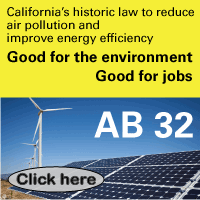AB 32: Now — now!!! — L.A. Times warns it imperils economy

March 5, 2013
By Chris Reed
 Seven years ago the California Legislature passed AB 32, the Global Warming Solutions Act of 2006, a landmark law forcing California to shift to cleaner-but-costlier forms of energy by 2020 to reduce the emission of the gases believed to cause global warming. The assumption was that, as it had with so many other environmental regulations, the Golden State would inspire the world to follow our lead.
Seven years ago the California Legislature passed AB 32, the Global Warming Solutions Act of 2006, a landmark law forcing California to shift to cleaner-but-costlier forms of energy by 2020 to reduce the emission of the gases believed to cause global warming. The assumption was that, as it had with so many other environmental regulations, the Golden State would inspire the world to follow our lead.
There were cautionary voices. Gov. Arnold Schwarzenegger told lawmakers he wouldn’t sign the bill unless it gave a future governor the option to suspend its enforcement in times of economic distress. This amounted to an acknowledgment of a basic fact: California’s economy would be at risk if the state forced the cost of energy to go higher, requiring businesses to pay more for a large basic budget item than their competitors in rival states and nations. The Golden State needed others to follow our lead for our policy to make economic sense.
But soon after, Schwarzenegger’s legacy hunt revved up, and he saw the opportunity to be Al Gore’s successor as a pin-up of global environmentalists. When California’s economy went into its deepest recession in 70 years, instead of invoking his executive authority to delay AB 32’s implementation, the governor began asserting that AB 32 amounted to a job-creation measure. This was talking point No. 1 of the Schwarzenegger administration for years.
The expects trashed the AB 32 happy talk
To say this was dubious is an understatement of immense proportion. A “peer review” of the California Air Resources Board’s upbeat analysis of AB 32’s economic impact released in late 2008 scorned the report as painting a rosy scenario. A specific warning noted the risks to manufacturing in California because energy played such a huge role in cost of operations.
 One of those peer reviewers — Harvard’s Robert Stavins, perhaps the world’s leading environmental economist — shredded the happy talk from the air board (and implicitly from others) in a memorable January 2009 interview with Stephen Moore of the Wall Street Journal.
One of those peer reviewers — Harvard’s Robert Stavins, perhaps the world’s leading environmental economist — shredded the happy talk from the air board (and implicitly from others) in a memorable January 2009 interview with Stephen Moore of the Wall Street Journal.
“None of us knew who the other reviewers were, but we all came up with almost the same conclusion. The report was severely flawed and systematically underestimated costs,” said Stavins, who chaired the U.S. EPA’s economic advisory committee during the Clinton administration.
Stavins asked a common-sense question: If this approach were such a job-creator, why would it have to be imposed on private industry?
But instead of heeding Stavins, his fellow peer-reviewers and common sense, the Los Angeles Times made an extremely curious journalistic decision. In its news pages, it either downplayed the possibility that AB 32 could backfire enormously, or treated the question as hotly debated, with experts on both sides. On its editorial pages, it usually treated the will-AB-32-backfire thesis as partisan rhetoric, exaggerated or flat-out wrong.
Never was this more evident than in its coverage of Proposition 23, the 2010 state ballot measure that sought to roll back AB 32 until unemployment was 5.5 percent or less for four quarters in a row.
The savaging of Prop. 23
Prop. 23 amounted to a straightforward extension of economists’ no-duh critique: Higher energy costs put California at a competitive disadvantage, and we shouldn’t want to dig ourselves a bigger hole with unemployment at the time already above 12 percent — far higher than the national rate.
But to the editorial board of the Los Angeles Times, Prop. 23 was nothing more than psycho Texas-style policy extremism. This is from the LAT’s Sept. 28, 2010 editorial:
“In 2006, taking a brief hiatus from the usual Sacramento gridlock, the Legislature passed and Gov. Arnold Schwarzenegger signed AB 32, a pioneering law designed to reduce California’s greenhouse gas emissions to 1990 levels by 2020. This year, a proposition that aims to kill the law was put on the Nov. 2 ballot by two Texas oil companies with a lot at stake. The cynical, misleading argument the companies are using to make their case is that AB 32 will deter job growth at a critical moment in the state’s economic recovery.
“Proposition 23 would suspend AB 32 until the state’s unemployment rate falls to 5.5% or below for four consecutive quarters. Backers insist that this wouldn’t negate the law because the rate is achievable — joblessness hit that mark just four years ago. Yet a global recession, which had nothing to do with California’s environmental standards, caused statewide unemployment to skyrocket to 12.4%, and it will take many years to recover from such a severe economic blow. Because meeting AB 32’s 2020 deadline requires immediate action, delaying implementation by even a year could render its goal impossible.
“Of course, the question of most concern to voters is whether AB 32 would worsen joblessness and slow the state’s recovery. Supporters and opponents of Proposition 23 draw on studies that reach opposite conclusions; the yes side says AB 32 would cost the state 1 million jobs, while the no side says it has already led to the creation of 500,000. We’re not convinced by either. The economic impact of AB 32 will depend on how it’s implemented by regulators, as well as variables outside anyone’s control or ability to forecast.”
Higher energy costs aren’t necessarily bad, you see, if you have enlightened regulators.
The Times channels Emily Litella: ‘Never mind.’
Now comes a moment that simultaneously brings to mind George Orwell, Emily Litella and the ninth season of “Dallas”: “We’ve always been at war with Eastasia.” “Never mind.” It was all a dream.
In Monday’s Los Angeles Times, the paper gave high-profile play to an 1,100-word analysis of AB 32 by reporter Anthony York. Six years and six months after the passage of AB 32, and four years and four months after the release of the peer review savaging the happy talk about AB 32, York treated as a given that the critique of Robert Stavins — and of Prop. 23 supporters — was accurate.
“When Gov. Jerry Brown called on his fellow governors at a conference in Washington last week to embrace a California-style pursuit of cleaner air, he was doing more than reinforcing the state’s image as an environmental trailblazer. He was trying to protect its economy.
“Brown needs other states and the federal government to adopt key elements of California’s environmental agenda, such as reaping more energy from renewable sources and capping greenhouse gas emissions, if those programs are to be successful here.
“The state’s aggressive pursuit of environmental goals has provided a new impetus for green jobs and federal subsidies. But the programs are costly to businesses, raising the price of their energy and forcing them to upgrade to cleaner manufacturing technologies.
“If others don’t go green, California could become an outlier, saddling businesses with costly new power while neighboring states continue to use traditional, cheaper energy, experts say. If the efforts under way in California spread to become the new normal, however, all will benefit from economies of scale.
“If more states order power companies to limit their use of fossil fuels, for example, the incentive will grow nationwide for firms to develop cheaper alternatives, leaving California consumers less exposed to spikes in electricity rates.”
Journalistic irresponsibility on an epic (fail) scale
So California’s leaders enacted a law that puts our industries and jobs at sharp risk unless other states copy us, and other states aren’t following us. And the most powerful newspaper in California refuses to acknowledge this basic fact until 78 months after the law was enacted?
Given the economic pain this state has gone through, this isn’t just a minor journalistic faux pas. This is epic in its irresponsibilty.
If reverse Pulitzers were given for coverage of a major issue, the Los Angeles Times’ coverage of AB 32 wouldn’t just be the winner. It would be recalled as the 1927 New York Yankees or the 1996 Chicago Bulls of horrible journalism.
Or, as the kids say, epic fail.
Related Articles
Push to increase CA green power mandate flops
On Jan. 6, a key provision was quietly struck from Assembly Bill 177, a measure introduced by Assemblyman V. Manuel
Story Of A Business Closure
SEPT. 30, 2010 My husband recently closed his manufacturing business. Only a few years ago, the company had 250 employees
After gamble backfires, L.A. demands refund from banks
In the San Francisco Bay area, public transit riders are paying $104 million in higher rider fees to cover



